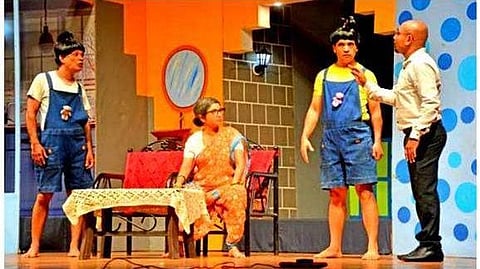

The story revolves around a couple Prakash (Ramanand), his spouse Trishu (Prashanti) and their two sons, Bittu (Rajdeep Naik) and Ittu (Rajesh), who are by nature slow learners. Regarding the upbringing of both the sons, Trishu is very practical while providing basic knowledge to Ittu and he picks up fast whatever is imparted to him.
But on the other hand, Prakash is not bothered about practicality, but insists that his other son, Bittu should study via tutorials and by hook or crook become a doctor. Those are the sheer aspirations of a father towards his son.
Over a period of time, Prakash’s mother Aiji (Suchitra Narvekar) steps in, knowing the adamant nature of her son. She offers a piece of advice as and when required, but to no avail.
As the siblings grow, Bittu shows inclination towards music. One fine day, when Ittu gets a jamboree in the house, Bittu picks it up and displays his expertise. But Prakash shows no signs of encouragement to his son.
Instead, Prakash’s focus is only educating Bittu to the maximum and either make him a doctor or an engineer. Finally, Bittu passes with a very low percentage in the examination. What follows next is worth the watch during the second half of the presentation.
Under the banner ‘Kalachetna Volvoi’, in ‘Kanni Novya Yugachi’ efforts have been made to blend Goa’s two theatre forms, namely ‘tiatr’ and ‘nattak’, to produce ‘Tiyatak’ on the stage. Undoubtedly, it was a good attempt, but the flavour of tiatr was missing and not prominently visible in the entire presentation.
While touching upon the subject of new education policy (NEP), a reference is made of 1986 education policy which was good, but not properly implemented. Good and valuable suggestions have been made in the presentation for the effective implementation of the new NEP. An important message is delivered of the pressures of the education system today on children, heightened by the ambitions of parents.
As far as acts are concerned, Ramanand and Prashanti are in command as spouses, with a good presentation of conflicts between them and a punchline at the end of every dialogue. Suchitra steps in as ‘Aaji’, carrying a good sense of humour under her sleeves. Child artiste Bhumee is appealing with brief entries and timely dialogue deliveries. Rajdeep and Rajesh as siblings keep the energy high throughout.
There’s (Kasulo) Roque Coelho and (Sosulo) Ehrlich Coelho reminding the audience about the age-old fable. They have their own ways of entertaining, but most of the comedy comes from the main acts via Rajdeep and Rajesh and their timings are simply apt.
There’s the opening, as in all Goan tiatrs, with father-son duo Roque and Ehrlich Coelho hopping on stage as tortoise and hare respectively. But unfortunately, it’s not a live rendition, instead a pre-recorded one. If not the full band offstage, maybe a mere keyboard would make a difference.
There are a couple of cantos in the acts which are hummable, but again pre-recorded and played in the background. Introduction of a couple of Konkani songs from our tiatrists in between the acts would justify the entire presentation.
The stage sets by Hemant Kansar deserve appreciation and lyrics by Alias Fernandes and music by Shahu Almeida respectively need to be commended.